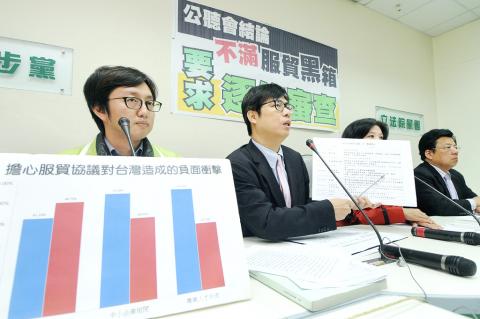Lawmakers are gearing up for battle today at the Legislative Yuan over who should preside over a joint committee meeting to screen the controversial cross-strait service trade agreement and whether the pact should be reviewed line-by-line, as stated in a previous consensus.
The Democratic Progressive Party (DPP) and the Chinese Nationalist Party (KMT) have been arguing over who should serve as the convener of the meeting, which includes all eight legislative committees. The convener, who will also serve as chairman, is expected to gain the upper hand in dictating the meeting’s procedure.
Based on a previous interparty consensus, DPP Legislator Chen Chi-mai (陳其邁) should be the designated convener because he was the convener of the last public hearing on Monday, the DPP argues.

Photo: Liao Chen-huei, Taipei Times
However, the KMT caucus says that it should be given the convener’s seat because it was the party that initiated the motion last year for a review of the agreement.
To prevent a potential KMT “ambush,” the DPP, which says it does not oppose the pact, but wants the agreement renegotiated, sent several lawmakers, including Chen, to occupy the meeting room yesterday evening.
According to a consensus reached during interparty negotiations in June last year, the legislature is to review the pact clause-by-clause after the conclusion of 20 public hearings to solicit opinions from various sectors of industry about the agreement’s potential impact.
However, the KMT has said that it could declare the pact effective immediately on the basis of Article 61 of the Act Governing the Legislative Yuan’s Powers (立法院職權行使法), which states that any executive order that fails to complete a committee review within three months of the plenary session assigning it to the committee shall be deemed passed and effective immediately.
KMT whip Lin Hung-chih (林鴻池) accused Chen of usurping his post as convener, adding that the DPP tried to take over the meeting so that the agreement would not pass.
Speaking at a press conference yesterday morning, Chen pledged that he would preside over the meeting fairly and professionally.
He added that the proposed service trade pact is a quasi-agreement between two countries and should be reviewed by the Legislative Yuan as most democratic countries do with their free-trade agreements.
“The Ma Ying-jeou (馬英九) administration wants the keep the DPP on the sidelines [of the joint meeting] because of its insistence that not one single clause of the pact should be altered,” he said.
Chen added that Article 61 does not apply to the service trade agreement because it is not an executive order.
Chen’s office released a survey of 185 academics, union representatives and non-governmental organization representatives who attended at least one of the 20 public hearings, and said the results showed widespread public suspicion about the trade agreement.
According to the survey, 56.2 percent of respondents said the negotiation process for the agreement was “opaque,” 45.4 percent did not support signing the agreement and 60.5 percent supported a clause-by-clause review.
The respondents were mainly concerned about three potential impacts of the agreement: an influx of Chinese workers (42.1 percent), effect on Taiwan’s small and medium enterprises (53.5 percent) and an acceleration of the outflow of talent to China (55.1 percent), said Chiang Chao-kuo (江肇國), director of Chen’s office.

South Korean K-pop girl group Blackpink are to make Kaohsiung the first stop on their Asia tour when they perform at Kaohsiung National Stadium on Oct. 18 and 19, the event organizer said yesterday. The upcoming performances will also make Blackpink the first girl group ever to perform twice at the stadium. It will be the group’s third visit to Taiwan to stage a concert. The last time Blackpink held a concert in the city was in March 2023. Their first concert in Taiwan was on March 3, 2019, at NTSU Arena (Linkou Arena). The group’s 2022-2023 “Born Pink” tour set a

CPBL players, cheerleaders and officials pose at a news conference in Taipei yesterday announcing the upcoming All-Star Game. This year’s CPBL All-Star Weekend is to be held at the Taipei Dome on July 19 and 20.

The Taiwan High Court yesterday upheld a lower court’s decision that ruled in favor of former president Tsai Ing-wen (蔡英文) regarding the legitimacy of her doctoral degree. The issue surrounding Tsai’s academic credentials was raised by former political talk show host Dennis Peng (彭文正) in a Facebook post in June 2019, when Tsai was seeking re-election. Peng has repeatedly accused Tsai of never completing her doctoral dissertation to get a doctoral degree in law from the London School of Economics and Political Science (LSE) in 1984. He subsequently filed a declaratory action charging that

The Hualien Branch of the High Court today sentenced the main suspect in the 2021 fatal derailment of the Taroko Express to 12 years and six months in jail in the second trial of the suspect for his role in Taiwan’s deadliest train crash. Lee Yi-hsiang (李義祥), the driver of a crane truck that fell onto the tracks and which the the Taiwan Railways Administration's (TRA) train crashed into in an accident that killed 49 people and injured 200, was sentenced to seven years and 10 months in the first trial by the Hualien District Court in 2022. Hoa Van Hao, a